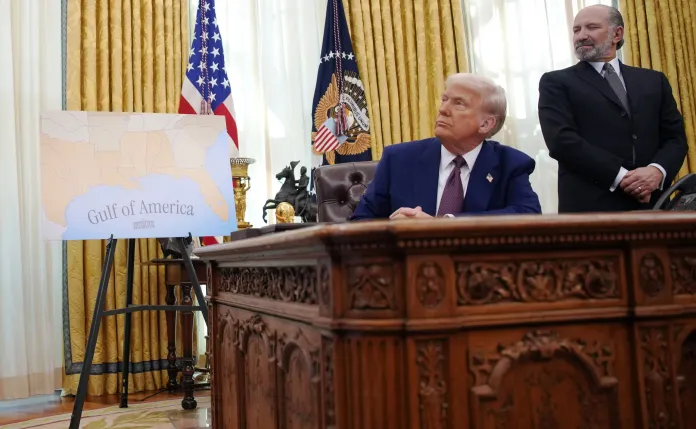A federal appeals court on Monday grappled with the legality of President Donald Trump‘s decision to bar Associated Press reporters from the Oval Office and other small White House spaces after a dispute over the naming of the Gulf of America, drilling into whether the First Amendment protects journalists’ proximity to the president.
Justice Department attorney Yaakov Roth told the U.S. Court of Appeals for the D.C. Circuit that Trump’s decision to cut off the Associated Press‘s participation in the press pool for small-space events was constitutional because the Oval Office and Air Force One are not First Amendment forums at all, but selective, invitation-only environments.
“When the president invites reporters into the Oval Office, is he creating a First Amendment forum? The answer to that is clearly not,” Roth said, arguing that viewpoint neutrality rules that govern the White House briefing room do not apply when the president chooses which reporters stand “within a few feet” of him during private events.

The dispute began after Trump ordered federal agencies to rename the Gulf of Mexico the Gulf of America. The Associated Press, citing its style standards, refused to adopt the new term except when noting its existence. This prompted the White House to remove the outlet from the daily pool rotation and limit its access to the president in late February.
The Associated Press sued three senior aides, arguing the restrictions were an unconstitutional attempt to coerce coverage. In April, U.S. District Judge Trevor McFadden, a Trump appointee, ordered the White House to restore the Associated Press‘s pool access, calling the measures a likely form of retaliation. A split D.C. Circuit panel later paused most of that injunction until oral arguments could be heard.
On Monday, a three-judge panel composed of two Trump nominees and one nominated by former President Barack Obama returned to the core question of whether denying access to small spaces is a retaliatory action or a presidential prerogative.
Judge Robert Wilkins, an Obama appointee, pressed Roth on why the court should end McFadden’s injunction at this stage, citing Supreme Court guidance that close constitutional questions often warrant preserving the status quo, which would have restored access to the Associated Press. Wilkins also challenged the DOJ’s narrow view of retaliation with a hypothetical involving a family denied a White House tour for criticizing Trump online. Roth ultimately said that “probably” would not violate the First Amendment.
Trump-appointed Judge Neomi Rao questioned whether the Associated Press‘s request could ever meaningfully enforce an injunction without effectively binding the president.
“Either you can enjoin the president and tell him that he must let AP into his office, or the president can decide who he lets into his office,” Rao said, suggesting that the White House staff could not obey both Trump and a court order.
Judge Gregory Katsas, also a Trump appointee, offered perhaps the clearest version of the administration’s position, warning against “room-by-room, space-by-space jurisprudence.” What mattered, he said, was not the physical location but the nature of the president’s relationship to his events.
“This case is all about access to the president,” Katsas said. “The Oval Office hosts any number of different events, and the president gets to decide that. It’s really different if the event is moved from the Oval to the Rose Garden or the East Room or somewhere else.”
Associated Press lawyer Charles Tobin countered that once the White House created a pool assignment policy in the 1930s, it became a government program that must operate on “reasonable and viewpoint-neutral” terms, no different from the hard-pass system the D.C. Circuit has protected for decades.
JUDGE ORDERS WHITE HOUSE TO RESTORE ASSOCIATED PRESS ACCESS AFTER GULF OF AMERICA DISPUTE
“The First Amendment does not stop at the Oval Office door,” Tobin said, urging the court to leave McFadden’s injunction intact. While the Associated Press may cover larger or general White House events, its access to “intimate” or invitation-only settings remains in flux pending the appeal.
The panel did not indicate when it will rule.
